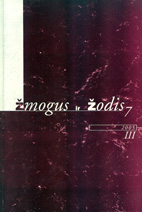Языковые средства формирования и выражения пространства в рассказе И. Бунина «Господин из Сан- Франциско»
The Expression of Space by Linguistic Means in I. Bunin's Story, The Gentleman from San Francisco
Author(s): Marija BirneySubject(s): Foreign languages learning
Published by: Vytauto Didžiojo Universitetas
Keywords: linguistic means; expresion
Summary/Abstract: This study offers an analysis of the main formal and semantic means of spatial expression represented in I. Bunin's, The Gentleman from San Francisco. In Bunin's text, the spatial attributes of open and closed become relevant principals in the story and are used to organize the spatial structure of the text. Lexical units of different parts of speech using both spatial and non-spatial semantics articulate these attributes. It is discovered that open space in the text, articulated by images of the ocean and the sea, actually indicate and have attributes of a confined space. Thus, a pretext is given to consider such space as closed. Closed space in the text is determined by the topos of civilization and is characterized by a number of distributive attributes including enormous, limited, unnatural (or artificial), still, confined, countable, and so on. These distributive attributes become the main semantic tool in Bunin's text, and create a space of nonexistence.
Journal: Žmogus ir žodis
- Issue Year: 07/2005
- Issue No: 3
- Page Range: 76-84
- Page Count: 8
- Language: Russian

